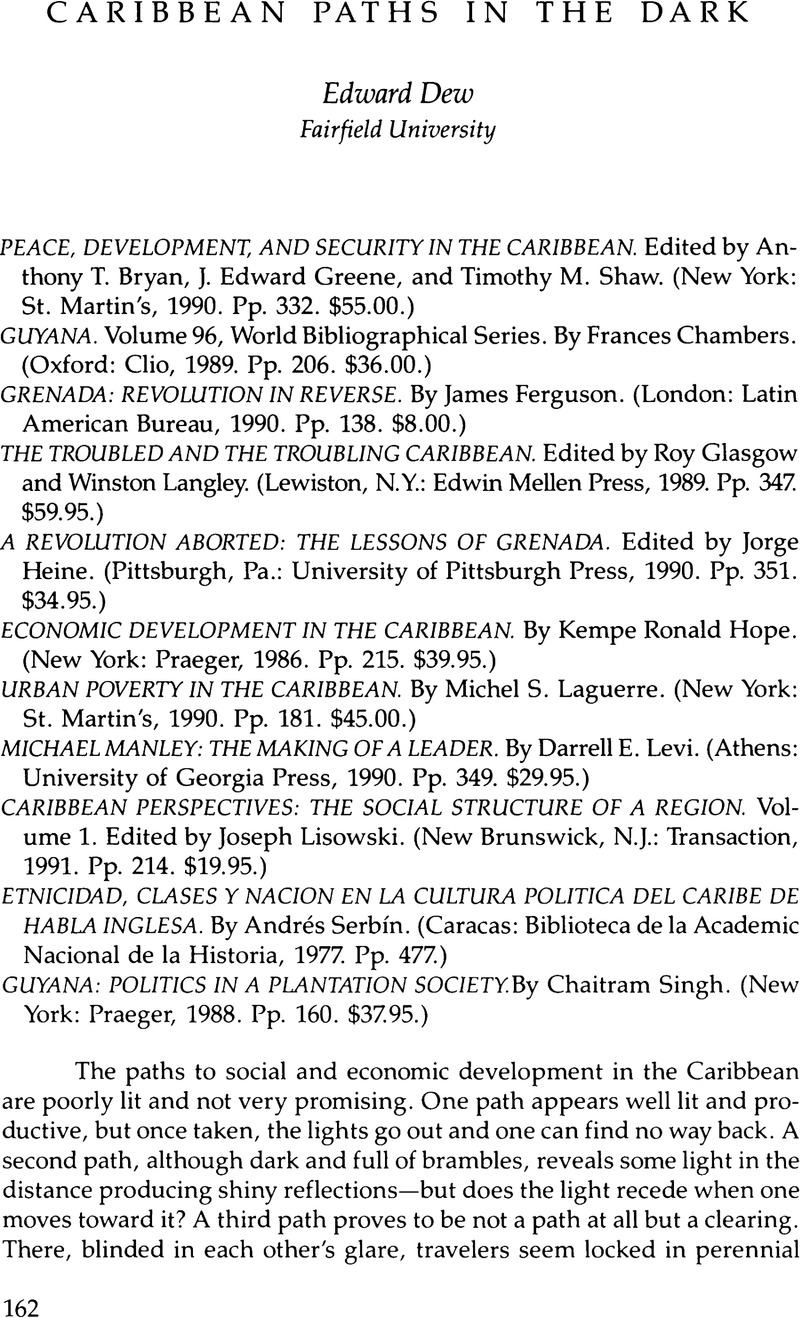No CrossRef data available.
Published online by Cambridge University Press: 12 October 2022

1. Earlier volumes include Hugh O'Shaughnessy, Grenada: Revolution, Invasion, and Aftermath (London: Sphere, 1984); Anthony Payne, Paul Sutton, and Tony Thorndike, Grenada: Revolution and Invasion (New York: St. Martin's, 1984); Paul Seaburg and Walter A. McDougall, The Grenada Papers (San Francisco, Calif.: Institute of Contemporary Studies Press, 1984); Tony Thorndike, Grenada: Politics, Economics, and Society (Boulder, Colo.: Lynne Rienner, 1985); Kai P. Schoenhals and Richard A. Melanson, Revolution and Intervention in Grenada; The New Jewel Movement, the United States, and the Caribbean (Boulder, Colo.: Westview, 1985); Jay Mandle, Big Revolution, Small Country (Lanham, Md.: North-South Publishing, 1985); Gordon K. Lewis, Grenada: The Jewel Despoiled (Baltimore, Md.: Johns Hopkins University Press, 1987); and The Caribbean after Grenada: Revolution, Conflict, and Democracy, edited by Scott B. MacDonald et al. (New York: Praeger, 1988).
2. See Walter Rodney, The Groundings with My Brothers (London: Bogle-L'Ouverture, 1969).
3. See, for example, Edward Greene, Race versus Politics in Guyana (Mona, Jamaica: University of the West Indies, 1974); Robert H. Manley, Guyana Emergent: The Post-Independence Struggle for Non-Dependent Development (Cambridge, Mass.: Schenkman, 1982); Henry B. Jeffrey and Colin Baber, Guyana: Politics, Economics, and Society: Beyond the Burnham Era (Boulder, Colo.: Lynne Rienner, 1986); Thomas J. Spinner, Jr., A Political and Social History of Guyana, 1945–1983 (Boulder, Colo.: Westview, 1984); Leo A. Despres, Cultural Pluralism and Nationalist Politics in British Guyana (Chicago, Ill.: Rand McNally, 1967); Percy C. Hintzen, The Costs of Regime Survival: Racial Mobilization, Elite Domination, and Control of the State in Guyana and Trinidad (Cambridge: Cambridge University Press, 1989); Andrés Serbín, Nacionalismo, etnicidad y política en la República Cooperativa de Guyana (Caracas: Bruguera, 1981); Rita Giacalone de Romero, Estudio histórico de la Guyana Británica (Mérida, Venezuela: Corpoandes, 1982); and Guyana Hoy, edited by Giacalone de Romero (Mérida: Corpoandes, 1982).
4. Gordon Lewis, The Growth of the Modern West Indies (New York: Monthly Review, 1968).
5. David Lowenthal's West Indian Societies provides contextual data on the West Indies, and Guyana in particular, combined with a rich bibliography. See Lowenthal, West Indian Societies (New York: Oxford, 1972). A number of pieces on Guyana can also be found in Lowenthal and Lambros Comitas's three-volume reader, West Indian Perspectives (New York: Doubleday, 1973).